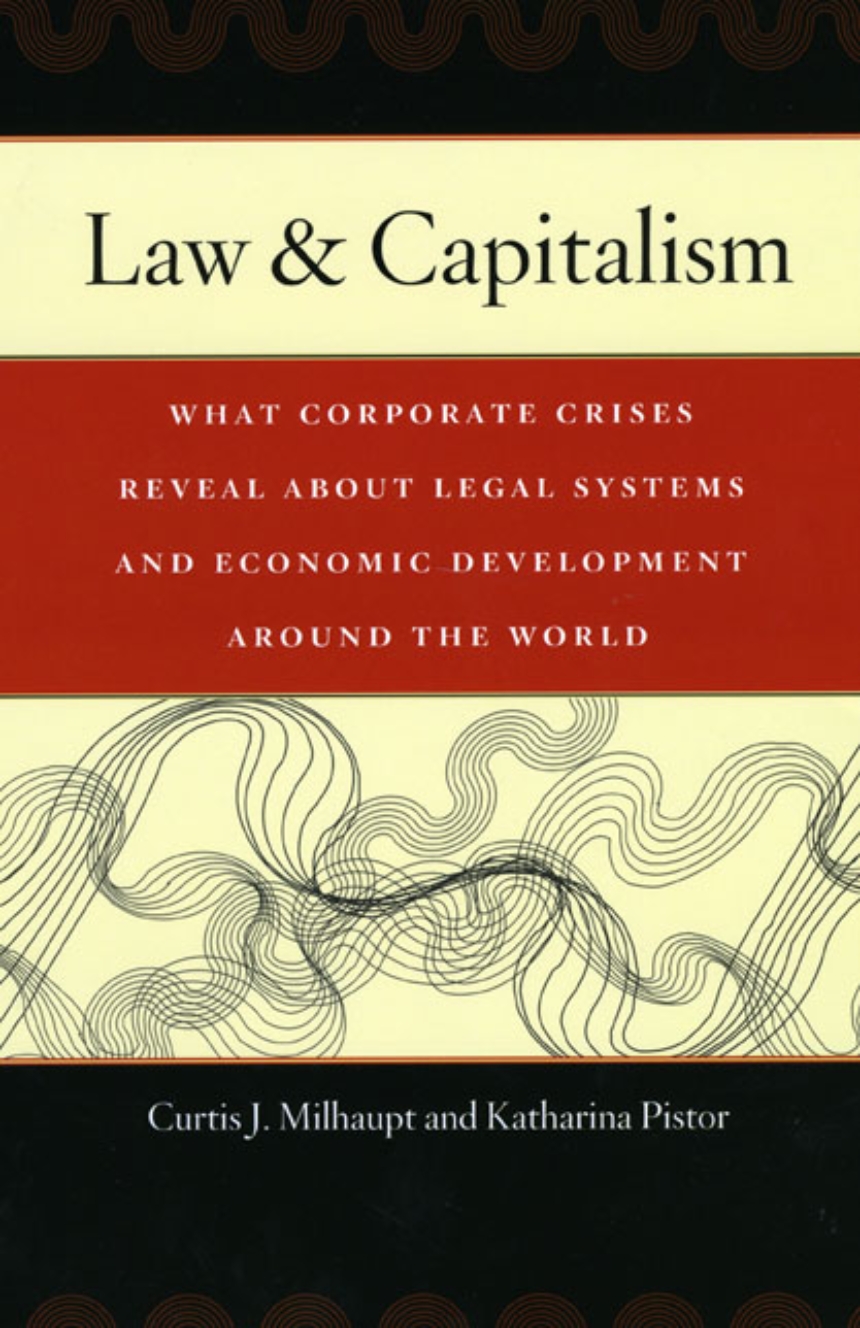Law & Capitalism
What Corporate Crises Reveal about Legal Systems and Economic Development around the World
9780226525280
9780226525297
Law & Capitalism
What Corporate Crises Reveal about Legal Systems and Economic Development around the World
Recent high-profile corporate scandals—such as those involving Enron in the United States, Yukos in Russia, and Livedoor in Japan—demonstrate challenges to legal regulation of business practices in capitalist economies. Setting forth a new analytic framework for understanding these problems, Law and Capitalism examines such contemporary corporate governance crises in six countries, to shed light on the interaction of legal systems and economic change. This provocative book debunks the simplistic view of law’s instrumental function for financial market development and economic growth.
Using comparative case studies that address the United States, China, Germany, Japan, Korea, and Russia, Curtis J. Milhaupt and Katharina Pistor argue that a disparate blend of legal and nonlegal mechanisms have supported economic growth around the world. Their groundbreaking findings show that law and markets evolve together in a “rolling relationship,” and legal systems, including those of the most successful economies, therefore differ significantly in their organizational characteristics. Innovative and insightful, Law and Capitalism will change the way lawyers, economists, policy makers, and business leaders think about legal regulation in an increasingly global market for capital and corporate governance.
Using comparative case studies that address the United States, China, Germany, Japan, Korea, and Russia, Curtis J. Milhaupt and Katharina Pistor argue that a disparate blend of legal and nonlegal mechanisms have supported economic growth around the world. Their groundbreaking findings show that law and markets evolve together in a “rolling relationship,” and legal systems, including those of the most successful economies, therefore differ significantly in their organizational characteristics. Innovative and insightful, Law and Capitalism will change the way lawyers, economists, policy makers, and business leaders think about legal regulation in an increasingly global market for capital and corporate governance.
280 pages | 3 line drawings, 1 table | 6 x 9 | © 2008
Economics and Business: Economics--Development, Growth, Planning, Economics--Government Finance
Law and Legal Studies: Law and Economics, Law and Society
Reviews
Table of Contents
Preface
Introduction
Part I: From Weber to the World Bank, and Beyond
One: The Prevailing View: Impact, Assumptions, and Problems
Two: Rethinking the Relation between Legal and Economic Development
Part II: Institutional Autopsies
Three: The Enron Scandal: Legal Reform and Investor Protection in the United States
Four: The Mannesmann Executive Compensation Trial in Germany
Five: The Livedoor Bid and Hostile Takeovers in Japan: Postwar Law and Capitalism at the Crossroads
Six: Law, Growth, and Reform in Korea: The SK Episode
Seven: The China Aviation Oil Episode: Law and Development in China and Singapore
Eight: “Renationalizing” Yukos: Law and Control over Natural Resources in the Russian Economy
Part III: Implications and Extensions
Nine: Understanding Legal Systems
Ten: Legal Change
Eleven: Conclusion
Notes
References
Introduction
Part I: From Weber to the World Bank, and Beyond
One: The Prevailing View: Impact, Assumptions, and Problems
Two: Rethinking the Relation between Legal and Economic Development
Part II: Institutional Autopsies
Three: The Enron Scandal: Legal Reform and Investor Protection in the United States
Four: The Mannesmann Executive Compensation Trial in Germany
Five: The Livedoor Bid and Hostile Takeovers in Japan: Postwar Law and Capitalism at the Crossroads
Six: Law, Growth, and Reform in Korea: The SK Episode
Seven: The China Aviation Oil Episode: Law and Development in China and Singapore
Eight: “Renationalizing” Yukos: Law and Control over Natural Resources in the Russian Economy
Part III: Implications and Extensions
Nine: Understanding Legal Systems
Ten: Legal Change
Eleven: Conclusion
Notes
References
